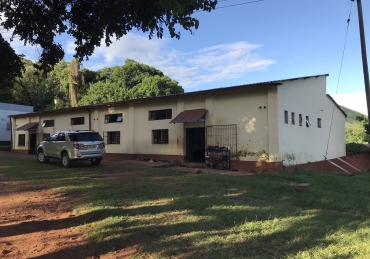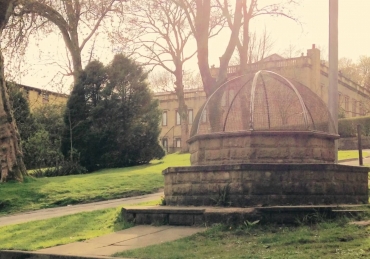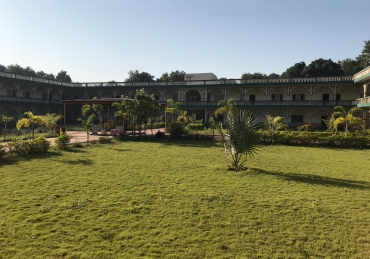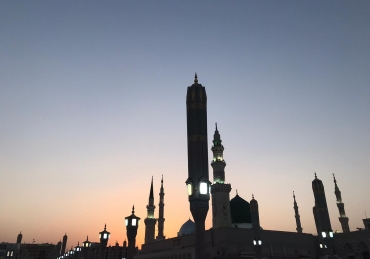Obituary for Mufti Taha Karaan (Rahimahullah)
By Dr Kallingal Riyad
بسم الله الرحمن الرحيم
الحمد لله رب العالمين، والصلاة والسلام على أشرف المرسلين سيدنا محمد وعلى آله وصحبه ومن تبعهم بإحسان إلى يوم الدين، أما بعد
Abu Umamah (may Allah be pleased with him) reported: The Messenger of Allah, peace and blessings be upon him, said:
فَضْلُ الْعَالِمِ عَلَى الْعَابِدِ كَفَضْلِي عَلَى أَدْنَاكُمْ إِنَّ اللَّهَ وَمَلَائِكَتَهُ وَأَهْلَ السَّمَوَاتِ وَالْأَرَضِينَ حَتَّى النَّمْلَةَ فِي جُحْرِهَا وَحَتَّى الْحُوتَ لَيُصَلُّونَ عَلَى مُعَلِّمِ النَّاسِ الْخَيْرَ
The virtue of the scholar over the worshiper is like my virtue over the least of you. Verily, Allah, his angels, the inhabitants of the heavens and earth, even the ant in his hole and the fish, send blessings upon the one who teaches people what is good.
Fudayl ibn ‘Iyad (may Allah have mercy on him) said:
عَالِمٌ عَامِلٌ مُعَلِّمٌ يُدْعَى كَبِيرًا فِي مَلَكُوتِ السَّمَوَاتِ
A scholar who works in teaching has a high status in the domain of the heavens. (Source: Sunan al-Tirmidhi, 2685)
Shaikh Taha Karaan left this world on Friday night as destined by Allah Almighty. Passing on to the next journey of life, start of the journey marking the end of the transient existence in this temporary world. May Allah reward the shaikh for his contribution to the spread of Islam and for his enthusiasm at training the next generation of Khaadims (servants) of Deen.
How much Shaikh touched upon the various genre of scholars and commoners is exemplified by the numerous audio and social media eulogies that have been circulated.
Shaikh Yaqub Mikus a former student of Shaikh Taha, amongst my teachers and currently a scholar in Chicago says: “A resplendent light and carrier of the Prophetic knowledge is no longer with us.” He further says: “There are few in our time who come near to equalling Maulana Taha’s qualities and character. He was an ocean of knowledge; through his words and actions, durar and fawa’id were bestowed benevolently on all those who sat in his company. He was a prolific scholar, a polymath endowed with encyclopaedic knowledge in a vast array of subjects. He wielded a pen with grace and eloquence. His recitation of the Qur’an and the Hadith was soul-touching. His intellectual acuity was unparalleled; his academic integrity was sincere; his ghayrah for Islam was that of the salaf’s. He had a profound love and respect for ulama, tullab, and those engaged in Islam’s service.”
Shaikh Abdurragmaan Khan, another student of Shaikh Taha was visibly emotional when he gave a eulogy on video after the Janaza Salah of the marhoom. He mentioned that Shaikh Taha didn’t just look after or be concerned about the knowledge and spiritual uplifting of the students, he took concern and actively helped students in their financial and social issues and always enquiring about their overall wellbeing and acted as a counsellor for the students.
Shaikh Yasir Qadhi in his post, reflected on his meeting with Shaikh Taha and said:
“Rarely in my life have I ‘clicked’ with someone so easily (الأَرْوَاحُ جُنُودٌ مُجَنَّدَةٌ) and I found myself dwarfed not just by his towering physical presence, but by his grasp of modern issues and contemporary authors and controversies. He was forward thinker, wed to the tradition; he cared little for narrow minded sectarianism and was eager to engage in the challenges facing today’s Muslim community…. From amongst those born and raised in the English speaking world, I can’t think of anyone whom I personally would view as having combined all of these aspects to the level Mufti Karan had’
This was how a scholar and giant of tradition effectively left a mark on plethora of scholars.
My own long journey of association with Shaikh started in April 2002, over 19 years ago. I had quite a few daunting questions of fiqh in the Shafii madhhab, in particular, when praying behind the blessed Ahnaf; how I wanted my prayer to be complete and yet not be different to the congregation. At that time I knew hardly any scholars. I uploaded a question on the askimam (Mufti Ebrahim Desai) website with these questions. They kindly forwarded my questions to Shaikh Taha. At the time, Shaikh was not so well known as he is now, nor did I know who Shaikh Taha was. Shaikh wrote a detailed response running into couple of pages and replied to me via his personal email. There began a journey. I wrote to him, not so frequently, and in one of my subsequent letters, introduced myself and my background and sought advise on how to educate my sons in the Shafii fiqh. Shaikh responded in a detailed email as to what books I could use, how to go about teaching them and some guidance on some institutes. Our communication was by email for a good period. Shaikh passed on his telephone number through a friend in 2006 and our communication was via text/email and then moved to WhatsApp.
We met in 2017, 15 years after our first communication, when Shaikh rahmatullahi alaihi arrived in Blackburn for the Ikhtitamul Bukhari at Bayt Muhammed Academy. It was a meeting that I cherished as we had never seen each other but exchanged many messages. He said, ‘It has taken 15 years for me to see who you are’. He met my sons and gave them sound advice.
During our candid conversations, he humorously mentioned the advice his esteemed father Shaikh Yusuf Karaan (RA) gave him when Shaikh went to Deoband. He had told him not to expect any special treatment; on the contrary, being a Shafii in an ocean of Ahnaf, he would face a rather uphill task. Shaikh took that as a challenge and spent hours studying. He graduated from Deoband, as we know with the highest score. Before he returned from India he bought the ‘Sharh al Muhadhdhab’ two volume copy from somewhere in Delhi. With this book, he went for either Umrah or Hajj and read the book through and through; eventually to become well versed with the rulings in the book. Shaikh also indicated to me during our conversation that he strongly approved the concept of an individual practicing on a personal basis on views that were within the madhhab that were not necessarily the mu’tamad (relied upon) position.
I had asked numerous fatwas from Shaikh, many related to the medical field. These included:
- On issues of Shafiis performing Salah behind a Hanafi Imam.
- Issues of breakage of fasting due to injections of various kinds.
- Fasting and issues for those with medical problems around the Nasal cavity, mouth or the back passage.
- Fasting rules in relation to covid 19 swab test, issues for health care workers on PPE and when Fidyah would be needed.
- Covid 19 vaccines, its permissibility, its purity, and other issues with them.
- Opinions on the type of foot covering that allowed Mash alal Khuffayn.
- Where the boundary of travel would be for jam’ and qasr for a musafir in modern context.
- Age of foetus from a medical viewpoint vs Islamic viewpoint.
- Issues surrounding miscarriage.
- Role of lasting power of attorney.
- Zakat on child trust fund
And few more, some lost from my WhatsApp messages when the backup failed, sadly gone forever from my collection as well as those discussed via text messages.
Shaikh’s responses to me were almost instantaneous for most of the questions. He would always give the strongest position in the madhhab and then give a few alternate views from scholars within the madhab saying ‘one may follow’ ‘it is permissible to assume their view as the basis of one’s practice’ ‘he may select as the basis of his practice the views of the Fuqaha of the madhab as Shaikh fulan or Shaikh fulan’ ‘A follower of the Shafii madhab would be well within his rights to practice upon this view’. Shaikh would often attach the textual material to support Shaikh’s opinion.
On some occasions Shaikh said, “I would suspend my verdict on this matter” and on some occasions, he would not give a response and I would not ask the same question again out of respect, though a follow-on question on a different matter few days later would be answered immediately. This clearly shows that Shaikh despite his wide knowledge did not feel he had to give a verdict on everything, nor did he claim knowledge of answers to every question. He was happy to say, ‘I need to think about this’ or ‘I don’t hold a view’ – an example of his humility despite being an ocean of knowledge. On one occasion Shaikh responded “This one is a bit of a conundrum. Will get back to you, in Sha Allah”
In March 2020, Shaikh contacted me for an opinion about a strongly worded message that he had received about the Covid 19 pandemic and the international response being exaggerated. Shaikh wanted to know if I could help him write a rebuttal. I was in lockdown in India and in quarantine and I considered it an honour. Shaikh had shared his own response to the message. The key point of his message expounded Shaikh’s humility. He challenged the writer who obviously was a scholar as to how he could take stance of understanding and interpreting medical and epidemiological data and statistics. And then of course, on equal footing, criticise the lay persons who seek to interpret Quran and Hadith to a come to a preconceived opinion. Shaikh’s strongly worded response clearly indicated that he knew where a scholar needs to take expert opinions and not start interpreting evidence out of his area of expertise. A clear indication of insight and wisdom.
My response was a short document predicting the possibility of second and third waves and mutations that target youngsters based on how the Spanish flu spread. In his response, Shaikh mentioned about his imminent fatwa of suspension of Jamaat salah, having suspended Jumuah salah prior to that. In December 2020, when the second wave thrashed many countries, almost 8 months after I wrote the document, Shaikh took time to send me a message about my prediction of second wave and the infection of the youngsters. Quoting Shaikh, “And from our present vantage point, it looks eerily Prophetic”. Point being that even after 8 months, he reflected on what I had written, and his earnestness in taking time from his busy schedule, to let me know of how he gauged what I had written.
Everyone Shaikh interacted with has similar experience of his warmth, down to earth and no-nonsense approach. Shaikh would intermittently send a Salam to me or gently remind that he appreciated the educative status posts I put on WhatsApp or his happiness at the questions that was being asked by my son to him or generally make duaa for the protection of me and my colleagues during the peak of the epidemic. When he saw my status post indicating that I had returned to UK after being locked down in India, he sent a pleasantly worded message ‘Hope you are happy to be home’. He took time from his busy schedules to clarify fatwas on Covid 19 related issues. Despite his busy nature, he gave everyone importance and value whilst some of us in the pursuit of life have done very little for the khidmat (service) of deen.
Shaikh’s departure was destined and the depth and breadth of his knowledge he shared to his students now is upon his students to carry forth a formidable task; a legacy that is difficult to emulate.
Shaikh collected the 40 ahadith on contagion and pandemics – Fleeing from fate to fate.
The 40th hadith is as follows:
Ya Allah, Shaikh Taha made duaa to you to accept each and every Muslim who left this world due to Covid in Your Court as a blessed and honoured Martyr. We make dua to You O Allah that you accept Shaikh Taha in Your Court as a blessed and honoured Martyr along with all those with faith who have succumbed to the pandemic. Ameen
وآخر دعوانا أن الحمد لله رب العالمين والصلاة والسلام على أشرف المرسلين سيدنا محمد وعلى آله وصحبه أجمعين
Dr Kallingal Riyad
Consultant General and Colorectal Surgeon
Leeds/Blackburn
To read a related article, visit the following link: Demise of Shaykh Muhammad Taha Karaan: a great loss for the Ummah








